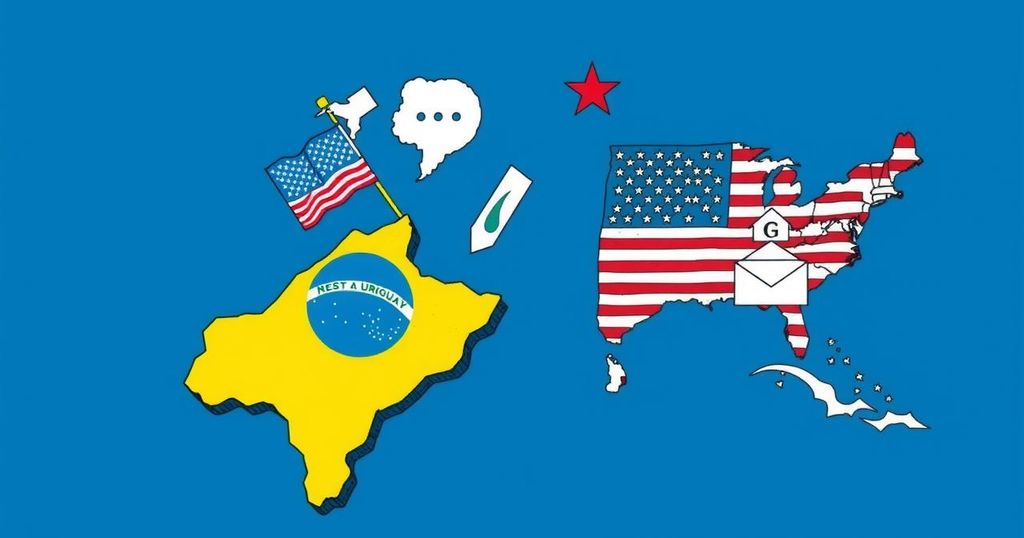Uruguay: A Beacon of Civility for Democracies Facing Extremism

Uruguay exemplifies a successful democratic model characterized by civility and transparency, contrasting sharply with the polarization seen in Brazil and the USA. The recent election campaigns were marked by moderation and professionalism, reflecting a stable political transition. President-elect Orsi, building on the legacy of ex-president Mujica, aims to implement welfare-oriented policies while promoting private sector growth, reinforcing Uruguay’s commitment to democracy devoid of extremism.
Uruguay offers a compelling example of effective democracy devoid of the extremism that characterizes political discourse in larger nations such as Brazil and the United States. The recent Uruguayan election campaign stood out due to its civility, transparency, and absence of hate-filled rhetoric, resembling a calm and orderly political process. This is in stark contrast to the polarized and often vitriolic campaigns observed in the United States and Brazil. The swift announcement of results and the professionalism displayed during the electoral process underscore Uruguay’s commitment to democratic principles.
Since the restoration of democracy in 1985 from military rule, Uruguay has seen alternation between centre-right and centre-left governments. This cooperative political environment has enabled the nation to maintain a pragmatic approach to governance. The latest election saw the victory of President-elect Orsi, a moderate leftist distinguished by his background as a former history teacher and mayor. His intention to embrace a welfare-focused domestic policy, without stifling private sector growth, signifies continuity rather than disruption in governance.
Orsi’s foreign policy represents a shift towards alignment with leftist regional counterparts, a departure from the preceding administration. The legacy of Orsi’s predecessor, ex-president José Mujica, continues to linger, characterized by a lifestyle of frugality and altruism. Mujica famously rejected the trappings of power, choosing to live simply and dedicating a significant portion of his salary to charity. His leadership style has emphasized reconciliation and forgiveness over divisiveness, challenging an approach that has taken hold in larger democracies.
Uruguay boasts remarkable social achievements, including low poverty and inequality levels. As part of the Mercosur customs union, it has cultivated strong trade relationships. The country’s appeal extends to foreign investors, exemplified by the presence of the Indian IT giant TCS, which has successfully expanded its operations in the region from its Uruguayan base. Additionally, Uruguay has gained recognition as a progressive leader in social issues, having legalized same-sex marriage, marijuana, and abortion rights.
Despite its size, Uruguay demonstrates that a nation can uphold principled politics free from the tensions and divisive extremism affecting many larger democracies. Its approach provides a crucial lesson for Brazil and the United States, emphasizing that a landscape of cooperation rather than confrontation fosters healthier political environments.
Uruguay, a small yet significant nation in South America, has managed to cultivate a political culture that prioritizes civility, transparency, and democratic integrity. This stands in stark contrast to the growing trends of polarization and extremism observed in larger democracies, particularly in the United States and Brazil. The country’s political evolution since the end of dictatorship in 1985 illustrates a balanced alternation between centre-right and centre-left leadership, which has prevented the rise of extremist figures in governance.
In conclusion, Uruguay serves as an instructive model for larger democracies grappling with extremism and divisive politics. Its electoral processes highlight the possibility of conducting politics without hate-driven agendas or threats to electoral integrity. The importance of civil discourse and pragmatic governance, as exemplified by its leaders, presents a pathway for other nations striving for more resilient democratic practices.
Original Source: www.theweek.in






